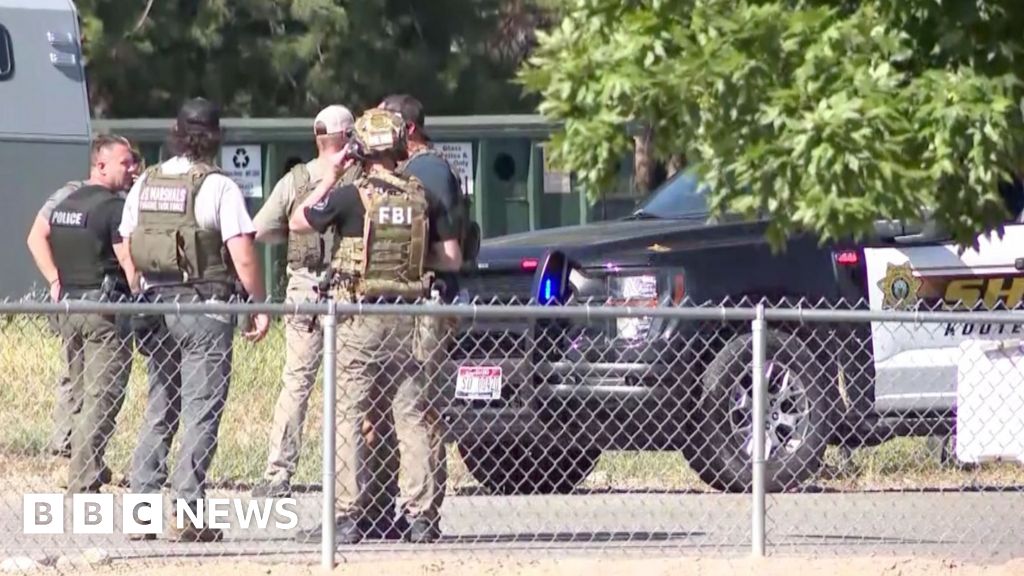In a dressing room behind the stage in the Metropolitan Opera House, Wynton Marsalis, the trumpeter and educator, intently watched a live feed of the big band representing the Osceola County School for the Arts, from Kissimmee, Fla. They were playing Dizzy Gillespie’s “Things to Come,” a piece that can expose any weaknesses in a big band. Being a good jazz musician isn’t just about playing fast and loud and high, but this song requires musicians to do all of that.
The school’s lead trumpet player was in the middle of a solo. A dexterous player who could hit the high notes, he sounded like a professional. “Watch, the director’s going to wave off the backgrounds here,” Mr. Marsalis said, using some colorful language to say the soloist had not gotten to his good stuff yet.
The director then made a small gesture to the rest of his band, telling them to wait to let the solo develop. It was a chart that Mr. Marsalis had surely heard live hundreds of times, but each time it is full of small decisions like these, making it a new experience.
It has been nearly a century since Duke Ellington’s orchestra became the house band at the Cotton Club on 142nd Street. Even there, where Ellington and his group of Black musicians played in front of all-white audiences, patrons were expected to be active listeners. Ellington is quoted in the book “Duke Ellington’s America” as saying the club “demanded absolutely silence” during performances, and that anybody making noise would quickly be ushered out the door.
Ellington knew his work had a signature. He wrote with particular members of his orchestra, like the saxophonist Johnny Hodges or the trumpeter Cootie Williams, in mind, and he believed that nobody else could sound like them, no matter how hard they tried.
Still, at Essentially Ellington, an annual high school big-band festival organized by Jazz at Lincoln Center and held over the weekend, teenagers from all over the world tried their hardest to channel those musicians anyway.
This year, in honor of the 30th anniversary of the festival, 30 big bands of the 127 that sent in application tapes came to New York to compete for top honors, up from the usual 15. The finalists included 27 American groups and bands from Australia, Japan and Spain. Each group selected three songs to perform from the Essentially Ellington library. The top 10 finishers advanced to a second and final, competitive round. The top three then played an exhibition concert — at the opera house instead of at Jazz at Lincoln Center’s Rose Room, since the additional capacity was needed — before a winner was announced.
But the event’s vibe, while exacting, does not feel like something out of the movie “Whiplash” — at least not anymore. Years ago, organizers felt the competition was getting too cutthroat, and looked to soften its edges. Now, students perform, but also jam with kids from other schools, attend clinics with professionals, and have meals where they’re seated not by school, but by the instrument they play. In the hallways, members of different schools spontaneously burst into song together.
“It’s like the top arts festival,” said Julius Tolentino, the jazz director at Newark Academy in Livingston, N.J., whose band won the competition in 2024. “There’s nothing that compares to this. They roll out the red carpet for the students. It’s changed the way band directors all over the world deal with jazz music.”
The organization’s work isn’t limited to the contest. It runs an annual training program for band directors and sends out professional musicians, often members of the Jazz at Lincoln Center Orchestra, to help guide bands that qualify for the finals.
The festival also doubles as a tool for the creation of a big band canon. For 30 years, the Jazz at Lincoln Center team has created sheet music for pieces by Ellington and some of his contemporaries, like Gillespie or Count Basie or Benny Carter, and has sent it out to schools interested in competing, for free. That process is not always simple, and often involves digging through the archives at the Smithsonian to look at existing, handwritten scores and transcribing from recordings.
“There’s a philosophy that jazz is a methodology, not an art form that has a canon,” said Todd Stoll, the vice president of education at Jazz at Lincoln Center. “The historical viewpoint of this music was, I won’t say ignored, but it wasn’t something that there was much focus on at the university level. I went all the way through a master’s degree at a major conservatory. I never played a note of Duke Ellington’s music.”
That would be unfathomable now, in part because of the work that Jazz at Lincoln Center has done. Mr. Marsalis bristled at the idea that Ellington was not an international star before the festival existed, but Essentially Ellington, and the work that makes it possible, may do as much as anything to ensure that his work persists.
For Mr. Marsalis, who has been at the center of debates about the jazz canon for decades, this could be a victory lap. But he insists on Essentially Ellington as an example of how playing old music does not need to be a backward-looking endeavor.
“We are not cynical,” he said. “When you’re establishing a new mythology, how much time do you have to attack the old mythology? Every band that auditions for a spot in New York is a part of that new mythology, an example of how the music is not a historical document, but something that is alive as long as it is being interpreted.”
The experience, however, can be intimidating until you are a part of it.
When Dr. Ollie Liddell, the band director at Memphis Central High School in Memphis, first saw videos on YouTube of groups that had reached the finals of the Essentially Ellington festival, over a decade ago, he thought to himself: “We’re never going to have a band that good.”
Memphis Central is a public high school, and like most public school band directors, Dr. Liddell is responsible for not just the jazz band, but the marching band and concert ensembles, too. He has to handle fund-raising and convince clinicians to come in and work with his band. None of his jazz students receive private instruction, save one, who receives lessons from a Memphis Central alumnus over Zoom. Essentially Ellington can’t always be top of mind.
That’s not the case for many of the groups that make it to New York, with arts magnet schools and private academies offering instrument-specific instructors, and a number of students taking private lessons as well. But even without those luxuries, a resourceful director and passionate kids can still compete. The proof? Memphis Central took first place at this year’s competition.
It is a cliché to say that jazz is an interactive music, a conversation. But those conversations aren’t confined to the stage. On Saturday, during its final performance for the judges, Memphis Central took the stage and the sound of Ellington’s “Rockabye River” came all at once. The rumble of the drum set’s low tom. The shout of the horns. The growling trumpet soloist punctuating each of the written phrases.
The work was brought to life and made new. A crowd filled with competitors and rivals sat with wide eyes and open mouths, with some yelping their approval.
None of them, clearly, were cynical.
Source link

















